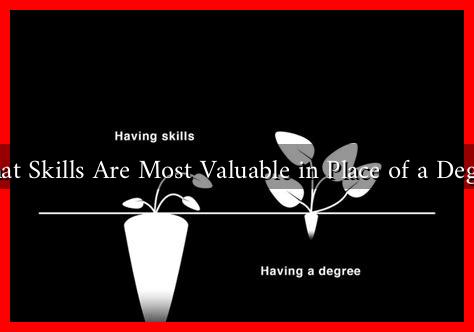-
Table of Contents
What Skills Are Most Valuable in Place of a Degree
In today’s rapidly evolving job market, the traditional pathway of obtaining a college degree is being challenged by the rise of alternative skills and experiences. Many employers are increasingly valuing practical skills, real-world experience, and personal attributes over formal education. This article explores the most valuable skills that can serve as a substitute for a degree, providing insights into how individuals can enhance their employability without following the conventional educational route.
The Shift in Employer Expectations
According to a report by the World Economic Forum, over 85 million jobs may be displaced by 2025 due to the shift in labor between humans and machines. This transformation is prompting employers to seek candidates who possess specific skills rather than formal qualifications. A survey by LinkedIn found that 92% of hiring managers consider skills to be more important than degrees when evaluating candidates. This shift highlights the importance of developing relevant skills that align with industry needs.
Key Skills That Hold Value
Here are some of the most valuable skills that can replace a degree in various industries:
- Technical Skills: Proficiency in coding, data analysis, and software development is highly sought after. For instance, platforms like Codecademy and Coursera offer courses that can help individuals gain these skills without a formal degree.
- Digital Marketing: With the rise of online businesses, skills in SEO, content marketing, and social media management are crucial. According to HubSpot, 61% of marketers say improving SEO and growing their organic presence is their top inbound marketing priority.
- Project Management: The ability to manage projects efficiently is invaluable. Certifications like PMP (Project Management Professional) can be obtained without a degree and are recognized globally.
- Soft Skills: Communication, teamwork, and problem-solving abilities are essential in any job. A study by the National Association of Colleges and Employers (NACE) found that 80% of employers seek candidates with strong interpersonal skills.
- Entrepreneurial Skills: The ability to innovate, take risks, and manage a business is increasingly important. Many successful entrepreneurs, like Richard Branson and Steve Jobs, did not complete college but thrived due to their entrepreneurial mindset.
Real-World Examples
Several individuals have successfully built careers without a degree by leveraging their skills:
- Elon Musk: The CEO of Tesla and SpaceX is known for his self-taught knowledge in engineering and physics, demonstrating that passion and self-education can lead to groundbreaking innovations.
- David Karp: The founder of Tumblr dropped out of high school and went on to create a multi-million dollar company, showcasing the power of practical experience and networking.
- Chris Wanstrath: Co-founder of GitHub, Wanstrath learned programming through hands-on experience and online resources, proving that skills can be acquired outside traditional education.
How to Develop These Skills
For those looking to enhance their employability without a degree, here are some effective strategies:
- Online Courses: Platforms like Udemy, edX, and LinkedIn Learning offer a plethora of courses that can help you acquire new skills at your own pace.
- Internships and Apprenticeships: Gaining hands-on experience through internships can provide valuable insights and skills that are highly regarded by employers.
- Networking: Building connections in your desired industry can open doors to opportunities and mentorship that can help you grow professionally.
- Personal Projects: Working on personal projects or freelancing can help you build a portfolio that showcases your skills to potential employers.
Conclusion
As the job market continues to evolve, the emphasis on skills over degrees is becoming increasingly pronounced. By focusing on developing technical skills, soft skills, and gaining real-world experience, individuals can position themselves as strong candidates in their chosen fields. The examples of successful individuals who have thrived without formal education serve as a testament to the value of skills and practical experience. In a world where learning is more accessible than ever, the opportunity to succeed without a degree is within reach for those willing to invest in their personal and professional development.
For more insights on skill development and career advancement, consider exploring resources like Coursera and Udemy.

